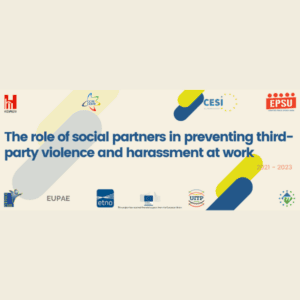2021-03-03 11:02
HOSPEEM, EPSU, CEMR, CESI as co-applicants, and ETF, ETNO, ETUCE, EUPAE, UITP as associated organisations, have been provided with financial support from the European Commission for a joint project in the field of social dialogue: “The role of social partners in preventing third-party violence and harassment at work” for the years 2021 to 2023.
 The project aims to assess the effectiveness at the national level of the EU Multi-sectoral social partners’ Guidelines to tackle and prevent third-party violence and harassment related to work (2010), which CESI signed in 2018, as part of the TUNED delegation, for the central government administrations’ sector. It will identify areas for improvements and explore possibilities for reviewing the Guidelines’ content and nature considering recent legislative developments and the ILO Convention 190 on Violence and Harassment (2019). It will also aim to be an awareness-raising tool on a gender-sensitive approach to violence and harassment at the workplace.
The project aims to assess the effectiveness at the national level of the EU Multi-sectoral social partners’ Guidelines to tackle and prevent third-party violence and harassment related to work (2010), which CESI signed in 2018, as part of the TUNED delegation, for the central government administrations’ sector. It will identify areas for improvements and explore possibilities for reviewing the Guidelines’ content and nature considering recent legislative developments and the ILO Convention 190 on Violence and Harassment (2019). It will also aim to be an awareness-raising tool on a gender-sensitive approach to violence and harassment at the workplace.
It will include a mix of capacity-building among EU sectoral social partners and evidence-based policy recommendations addressed to the project partners, their members, and public authorities. It will consist of two European conferences with sectoral break-out discussions, seven webinars.
The project focuses on the public services sector, i.e., government, hospitals, education, public transport, supported by examples drawn from the private sector, allowing to compare sectoral specificities and produce general policy recommendations.
The project will run for 24 months: this will allow the delivery of a full project cycle, including preparatory activities, implementing the work plan, and disseminating results. The work plan foresees the organisation of seven webinars and two conferences.
The activities have just began this March with the launch of a Call for Tender, open until beginning of April, with the aim of finding a researcher, or team of researchers, who will carry out comparative research on the prevalence and causes of third-party violence and harassment in the targeted sectors across the EU, legislative and social partner responses and assessment of the Guidelines’ effectiveness. The research will help social partners draw up their own conclusions on how to improve the Guidelines’ implementation and, if necessary, based upon evidence, their content and nature.
This joint social partners’ project will be a way for CESI to continue raising awareness on the crucial topic of third-party violence at work, after the successful conclusion of its own EU-funded project #NOVIOLENCEATWORK.



